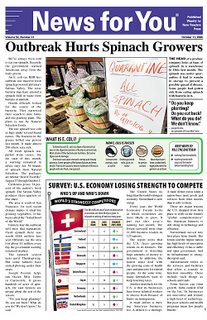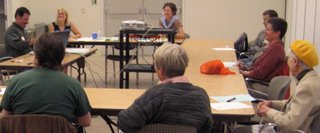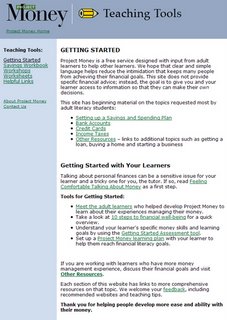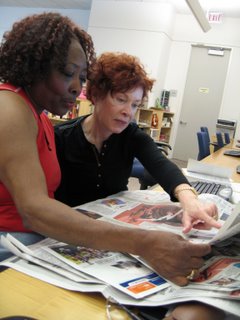Project Read at The Bridge at Main is the adult literacy program of the San Francisco Public Library. We help English-speaking adults improve their basic reading and writing skills so they may access greater opportunities in their lives. This is a friendly internet site where adult learners can share what they have written as part of their tutoring sessions or on their own.
- This is a moderated site, so submissions and comments will first be reviewed before being approved and published.
- Adult learners submitting their writing have the option of using their first name (only) or using "anonymous" for authorship.
- We wish to honor the writing efforts of the adult learner/authors, so no major copy editing will be applied, but we may suggest minor corrections in consultation with the author.
- Only active Project Read learners are eligible to submit their writing to the Write Away blog and there are two ways of doing this: send submissions via email to projectread@sfpl.org, or stop by the office with a hard copy of your writing.
- The views and opinions expressed on this web site are solely those of the original authors and contributors. These views and opinions do not represent those of the San Francisco Public Library and/or the City and County of San Francisco.
Wednesday, November 08, 2006
Tips for Tutors from the November Round Table Discussion
On encouraging their adult learners to write...
One tutor said her learner showed immediate interest in writing in a Response Journal. The learner's first entry was a page long! The tutor and learner will pass the journal back and forth responding to what each other have written. The tutor was careful to remind the learner that what she writes in the journal doesn't have to be perfect; spelling and grammar are not as important as just getting thoughts down on paper as a first step.
Another tutor at the meeting mentioned that his learner is quite comfortable taking risks when writing, which of course is a great way to learn. His learner turns in as many as 3 or 4 pages of written material which the tutor-learner team then goes over to look for random mistakes and patterns of errors. His learner is highly motivated to start working on punctuation and grammar.
A third tutor at the meeting said that her learner is less comfortable sharing the very personal things that she writes about in her journal. She keeps her journal writings to herself and uses what she writes as a way to deal with life's challenges. Everyone agreed that writing as often as possible, even when material is not shared with the tutor, is a step in the right direction.
On improving comprehension skills...
A tutor at the discussion asked about methods she could use to help her learner improve her comprehension skills. The importance of working on pre-reading activities was discussed. Ideas that were shared included: using a Mind Map to brainstorm vocabulary that the learner already knows regarding the topic he/she is preparing to read about; asking specific literal comprehension question before the learner reads so that he/she stays focused while looking for the answer to the question; using photos accompanying a book or article to generate a pre-reading discussion of what the material might be about; scanning the reading material to locate words that might be difficult for the adult learner--this can be done beforehand by the experienced tutor who knows the vocabulary that is likely to challenge the learner or together as a tutor-learner team before the material is read by the learner.
Thursday, October 05, 2006
News for You -- a weekly newspaper for adult learners available in Project Read office

News for You, a weekly newspaper written for adult learners and published by New Readers Press, is now available in the Project Read office. This four-page newspaper contains easy-to-read stories about national events, sports, famous people, as well as special features. New Readers Press has complied a list of instructional tips for tutors/teachers using News for You with their learners.
Follow this link http://www.news-for-you.com/teachers/index_headlines.html then click on "Teaching Tips" on left side of web page.
Wednesday, October 04, 2006
Notes from October Tutor Roundtable Meeting
- One tutor asked why his learner may still be having trouble decoding simple sight words even after the tutor points out the error.
A discussion followed about the importance of repetition and ongoing reinforcement of basic skills in the tutoring sessions. For most learners, it is not enough to address an error on a one-time basis. Instead, the problem words should be worked on at each session until the tutor is convinced that his/her learner can successfully decode and spell the word. In this effort it's important for the tutor to utilize multi-sensory techniques so that the learner is not only seeing the word on flash cards but also hearing it, and working with it in a kinesthetic, or tactile way (Scrabble tiles, tracing letters on desk or in the air, etc.). As tutors we sometimes forget that learners have a lifetime of making the same errors over and over because they never learned the basic skills necessary to be successful readers and writers. We can't expect them to learn these skills if we only address them once in a while during the tutoring sessions. It's the tutor's responsibility to create a lesson plan based on the needs of the learner and to follow through with that plan, providing the necessary repitition and reinforcement, at each meeting.
- Another tutor at the Round Table asked for ideas she can use to address her learner's goal of reading for pleasure.
One tutor suggested that she talk with her learner about getting involved in the Wednesday Night Readers Book Club. Even if some of the books being read are a bit challenging for the learner, she/he can also listen to the recorded book (also provided FREE to all learners) and still participate in the monthly book discussion. The learner-friendly environment of the book club is a wonderful opportunity for learners to express their thoughts about what they have read and hear differing opinions from their fellow learners. The book club experience can really enhance the reader's enjoyment of a book. Previous book club selections, both books and tapes, are also available in the Project Read office to be checked-out by tutor-learner teams. For the October 25th Wednesday Night Readers meeting, learners and tutors are reading Something Wicked This Way Comes by Ray Bradbury (books & tapes still available in the office). For the November 29th meeting, the group will be reading God Rest Ye Merry Soldiers: A True Civil War Christmas Story by James McIvor.
Saturday, September 16, 2006
Continuing Ed. Class for Tutors
Thursday, October 19, 2006
6:00 - 7:30 p.m.
Main Library - Latino/Hispanic Room - Lower Level
Please call the Project Read office @ 415.557.4388 if you plan to attend.
Wednesday, September 06, 2006
Tips for Tutors from the September Round Table Meeting
- A tutor discussed the difficulty she has with putting together a long-range instructional plan when at each session her learner seems to have a reading or writing task that must be addressed immediately--often work-related.
One excellent suggestion was to keep track of the basic skills that these work-related tasks involve and at some point sit down with the learner, look at the list, and prioritize which skills are most important to the learner and which ones he or she would like to start working on first. Then create a long-range plan to teach those skills and work through that plan at each tutoring session.
- Another tutor brought up the challenge of motivating his learner to set goals and stay focused on those goals from session to session.
A tutor suggested this simple mental exercise that might help the learner understand the commitment needed to reach his or her personal goals. The suggestion was to ask the learner if she or he has ever decided to learn or accomplish something, worked hard at it, and ultimately been successful. This can include just about anything in life--learning to play an instrument, learning to fix a car engine, completing a rehab. program, etc. Then ask them to describe what they did to be successful--what commitment did they make, and how much time did they devote to reaching this goal? Then, the learner can think about applying the same time and commitment to the reading and writing goals that he or she has set.
- A tutor asked for ideas for helping his learner organize his thoughts so that he will be able to write as clearly as he speaks.
One creative suggestion was to have the learner record himself as he tells a story, and then ask the learner to use the recording as a basis for completing a writing exercise. And don't forget to praise the learner for his excellent vocabulary and speaking skills. Spoken language, after all, is the starting point for all writing.
The September Round Table discussion was a great example of just how helpful and informative these sessions can be. Everyone attending offered their suggestions, based on their own tutoring experience, and helped their fellow tutors find new ways to address a variety of instructional challenges. So come by and join the discussion at one of these upcoming Tutor Round Tables -- October 3 and November 7 (6:00 PM in the Project Read Conference Room).
Wednesday, August 23, 2006
Notes from Project Money Workshop for Tutors


On Thursday, August 17, Project Read presented a continuing education workshop for volunteer tutors on the subject of helping adult learners achieve their financial literacy goals. This workshop focused on the learner-developed information (handbook and website) created by the Project Money team.
Highlights from the evening's workshop included:
A discussion of the barriers which prevent tutor-learner teams from working on financial goals. An excellent resource on this topic can be found on the Project Money website - www.projectmoney.org - in the Teaching Tools section. It's called "Feeling Comfortable Talking About Money" and it reviews reasons why adult learners may be sensitive about financial issues, and what tutors can do to make the learner feel safe in order to promote an open discussion of the topic. You can view this document at the following link: http://www.projectmoney.org/teaching/talking.html
We also discussed tools available on the website to help tutor-learner teams assess what the learner already knows about banking, credit, savings, etc., and what they need to learn: http://www.projectmoney.org/teaching/gettingstarted.doc (MS Word document) is a link to "Getting Started, a Self Assessment Tool". After working through this resource, you can go on to the next step of putting together a "Project Money Learning Plan": http://www.projectmoney.org/teaching/learningplan.doc (MS Word document).
Remember, the Project Money website has easy to understand information on many financial literacy topics. The information included on the site was researched and edited by adult learners themselves with the expert assistance of community advisors from financial institutions as well as volunteer tutors who then road- tested the instructional material.
Wednesday, August 02, 2006
Tips for Tutors from August Tutor Round Table
- How did you break the ice with your learner during your first meeting? One experienced tutor mentioned that it's always a good idea to talk a little bit about yourself and what brought you to Project Read as a volunteer. Another good suggestion was to bring the learner's Goals Sheet, which you received from the office, and have a discussion about which goals are most important to the learner and need to be worked on first.
- How will I learn which instructional techniques work best for my learner? The experienced tutors all said that patience is the key. It doesn't happen overnight, but after a few sessions, you will get to know how your learner learns best and the techniques that resonate with his/her learning strengths.
- How do I encourage my learner to use the computer lab, especially if he/she has never used computers before? One tutor mentioned that the process by which a new learner receives a Lab License is designed to make any learner comfortable with the hardware and software found in the Project Read computer lab. This step-by-step introduction to the lab can be completed with the help of a staff member, or with the tutor there as a coach. Another tutor made the comment that the computer lab is there to reinforce what you are already doing in your tutoring sessions, and learners that have the motivation and time to utilize the lab in between tutoring sessions can make even more progress towards their goals. There are adult learners who do not regularly use the lab, so it is not absolutely necessary to the one-to-one instructional program. A tutor at the Round Table mentioned that she and her learner had not yet gotten around to working in the lab, but she was intending to go to the lab with him at an upcoming tutoring session.
Wednesday, July 12, 2006
Monday, June 19, 2006
Schedule of Tutor Round Table Meetings -- July through November 2006
Here are the scheduled meeting dates for the rest of 2006:
Tuesday, July 11
Tuesday, August 1
Tuesday, September 5
Tuesday, October 3 and
Tuesday, November 7
The meetings take place in the Project Read Conference Room and begin at 6:00 PM. We provide some tasty pizza and beverages.
These informal discussions normally last one to one and a half hours depending on the number of tutors who attend. Please call our office at (415) 557-4388 if you plan to attend a Round Table meeting.
Friday, June 09, 2006
Tips for Tutors: Topics from the Tutor Round Table Meeting on June 6th
- One tutor at the meeting mentioned that her learner has difficulty understanding how and why punctuation is used. This problem occurs when reading and writing.
One suggestion offered involved using the technique of DUET READING to help the learner understand how punctuation is used to add meaning to any style of writing. As you recall in duet reading the tutor and learner read a text simultaneously. In this way, the learner can begin to hear how punctuation influences the flow of reading and the meaning of what is being read.
To help beginning writers understand the nuances of grammar and punctuation we have handy FREE books available in the Project Read office. Two that might be hepful are: Punctuation Power: Punctuation and How to Use it, and Write All About It.
- We also discussed the challenge of teaching an adult learner about the structure of writing and how important it is to express oneself clearly in order for others to undersand what you've written.
- Another tutor spoke about the word substitutions her learner often makes when reading aloud. The word substituted will often have just one incorrect letter which of course creates an entirely different word. For example the word blend may be substituted for the word bend.
Join us for the next Tutor Round Table Meeting on Tuesday, July 11, from 6:00 - 7:00 pm in the Project Read Conference Room.
Friday, May 19, 2006
New Instructional Materials Available for Tutor-Learner Teams
- Flipping Phonics, New Readers Press, 1997
This is an excellent instructional tool for beginning or intermediate level learners who are working on basic phonics skills. By flipping through the letters and adding different beginning and ending consonants to the middle vowel sounds, learners will soon be able to read words more quickly as they begin to understand the sounds of the letters. - Action Grammar: Fast No-Hassle Answers on Everyday Usage and Punctuation, by Joanne Feirman, Fireside Books, 1995
This little book answers any questions a tutor-learner team may have about grammar and punctuation. Clear examples are given for each rule, and the appendix includes a section covering the most commonly made mistakes. - Punctuate It Right! A Complete Quick-reference Guide to Modern Punctuation, by Harry Shaw, Harper-Collins, 1993
This is a book for tutors who need to remind themselves of the rules of modern punctuation. It is a very comprehensive guide to punctuation; however, the explanations are probably too difficult for adult learners to use successfully on their own. - Writing with Style: Making Your Writing Stand Out, by Sue Young, Scholastic Books, 1997
An excellent instructional tool for tutor-learner teams working on higher level writing skills, this book offers information on how to organize ideas before you write, create grammatically correct sentences, arrange sentences for maximum effect, create effective paragraphs, and proofread for mistakes. - Get Wise! Mastering Reading Comprehension Skills, by Nathan Barber, Thompson-Peterson’s, 2000
This book is full of exercises and techniques that can help any reader improve basic comprehension skills. Although written humorously for middle and high school students, the techniques are still effective and the entertaining style could make it fun for a tutor-learner team to use. - Barron’s Pocket Guide to Study Tips, by George Ehrenhaft & William Armstrong, Barron’s Educational Series, 2004
This book is an excellent resource for advanced level Project Read learners who are now, or soon will be, taking classes at the college level or preparing for the G.E.D. exam. It is full of techniques and strategies to improve time management, note taking, reading comprehension, working with individual learning styles, writing with clarity, and many more important topics.
Thursday, May 11, 2006
Project Read Learner Wins Writer to Writer Competition
On May 11th, the California State Library and California Center for the Book announced the winners of the Writer to Writer Challenge for adult learners. Project Read's Leona Whytus was chosen as the winner in the category of beginning level learner. Leona submitted a letter she wrote to Mildred D. Taylor, author of Roll of Thunder, Hear My Cry. This was a book Leona read, along with other members of the Wednesday Night Readers book club, in February of this year.
The winners and finalists will be honored at the "Books Change Lives" Ceremony, hosted by the California Center for the Book, at the Santa Monica Public Library on June 3rd. Their letters will be posted onto the Center's website (www.calbook.org) and the California State Library will also publish a booklet of their letters.
Friday, April 21, 2006
Tutor Tips: WIN Game
Friday, April 07, 2006
- What to do when learners guess at words when reading or writing, and the words they are guessing are not phonetically similar to the correct word. One suggestion made was to help the learner understand the sound-symbol relationships of the difficult word by working with word patterns. Together build a list of other words containing the same ending sounds, but with different beginning consonants, so that the learner can see the pattern for spelling the sound.
- How to encourage reluctant writers. One of our tutors brought in a fun and helpful book that can assist anyone suffering from writer's block. The title is: The Write Brain Workbook: 366 Exercises to Librarte Your Writing by Bonnie Neubauer. Here's what the publisher has to say: "Provides 366 10-minute exercises to build momentum and turn off the left side of the brain. Helps readers generate work by painlessly leading them into new writing every day. Stimulates creativity with a stunning color package and easy-to-approach prompts." We will try to order a few copies of this title to have on hand in the Project Read office.
Tuesday, April 04, 2006
Tips From March 7, 2006 Tutor Roundtable
Here are some tips that came out of that meeting.
- Don't just teach spelling and grammar rules. Build interesting lessons around the rules.
- NTC’s Easily Confused Words by Deborah K. Williams is a very useful book. It can be found in the Main Library's International collection. Project Read is going to order some copies and will make them available in the office.
- It can be very beneficial to sessions if a tutor keeps things organized and structured.
- Add some variety to your tutoring sessions. Do some different things to keep it interesting.
- Use the SFPL Learning Express online materials. There is a direct link from the Computer Learning Lab Links page.
- It can be an effective writing strategy to do some lessons around writing directions (driving, cooking, using a computer program, or anything that is of interest).
- Don't get discouraged if it seems like progress is slow. It takes time - just keep at it. Practice leads to increased fluency and improved skills.
- If a learner can't meet consistently and / or doesn't have the time to do outside activities that reinforce what is learned in the sessions - then perhaps it is not the right time for that learner to be in our program. He/she can take a break and resume tutoring when his/her schedule can better support ongoing tutoring.
- Request: Could Project Read create some kind of organized method for accessing old and late breaking tutor tips and other resources?
- Response: Yes, we are working on a blog. In fact, here it is. Enjoy!
Thursday, January 05, 2006
Welcome

This is a blog for Project Read. We are a free service of the San Francisco Public Library. We train volunteers from the community and match them with English-speaking adults who wish to improve their reading and writing skills.
We'll use this blog to share news and helpful tips. We'll add entries on a fairly regular basis so do drop by and visit us again. You can also keep up with us by copying and pasting our Atom Site Feed link into a My Yahoo page or other site feed reader.
All the best (and a smidge more), Brian


